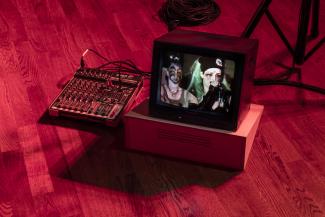We want Rebel music, street music. Music that breaks down people’s fear of one another. Crisis music. Now Music. Music that knows who the real enemy is. Rock Against RacisM. Love Music, Hate Racism.
— Temporary Hoarding magazine (1977)
Come sing 1970’s and 80’s British anti-fascist anthems at Access Gallery’s Corner Store, featuring the two-tone, reggae, ska and punk music that shaped the anti-Thatcher movement Rock Against Racism in Toronto-based artist Andrea Creamer’s participatory performance work Anti-Fascist Karaoke Lounge Party (2018).
The Anti-Fascist Karaoke Party will be preceded by the screening of five short films, totalling 30 mins in run time. Complementing and informing the event the short film program, selected by Creamer, deals with themes of Fascism, Decolonial Acts, Protest, Resistance, and Solidarity both directly and in the abstract. The screening includes: Rob Thompson’s Diary of a Neo-Fascist, Judith Doyle’s Christy Cameron: Legionella’s Manifesto, Paul Wong’s Set Fires, and Manuel Saiz’s All Resistance is Useless.
The screening starts at 8pm, with a brief intermission before Karaoke starts.
About the project:
Toronto-based artist Andrea Creamer’s body of work is grounded in the premise that we need to develop new sites of resistance in order to adequately address our current state of politics and our state of social emergency. She believes these sites should be inclusive of radical thinking and practice, fostering change that enacts alternative modes of organizing through embodied or relational ways of taking space and ultimately create new forms of encountering both the social and political. Creamer’s Anti-Fascist Karaoke Lounge Party (2018) provides such a site, in the form of a karaoke event.
In Karaoke, a participatory performance work, Creamer brings together 16 songs spanning the late 1970’s to early 1980’s representing the two-tone, reggae, ska, and punk music that shaped the movement which became Rock Against Racism (RAR), an important counterpoint to anti-labour and anti-immigration conservativism emblematic of Margaret Thatcher’s United Kingdom. Functioning like a traditional Karaoke party, Creamer’s work creates space to consider protest and solidarity in the form of a karaoke event, asking where do we find our collective sites of rebellion and resistance of tomorrow, and what form do they take? When does the political move from being only performative to being an engaged and participatory way of sharing space? And, as Cedric Johnson asks in Sites of Resistance: “how do we elevate lineages, spaces of dissent, and marginalized stories of interracial collaboration, as well as histories of direct conflict and challenge in contested spaces?”
ARTIST'S BIO
Andrea Creamer is renter, a worker, community organizer, and interdisciplinary artist currently residing in Toronto. Her works investigate spaces of contestation, counterpublics, and notions of site-specificity. Often articulated in the form of text, painting, sculpture or video, her material practice reflects on forms of protest, the mechanisms that produce social spaces, and the ephemeral and always shifting character of socially-based practices. She is a recent graduate from the Masters of Visual Studies program at the University of Toronto.
About Rock Against Racism:
Rock Against Racism was a plurality of events and organizing that took the form of mass demonstrations, riots, concerts, and anti-fascist carnivals across the United Kingdom in protest against the increasingly frequent and violent attacks on racialized communities by far-right political groups such as the National Front as well as by the police. Triggered initially by a number of events, in particular; rock musician Eric Clapton’s 1976 racist comments onstage speaking out in favour of Conservative MP Enoch Powell, who eight years earlier had made his inflammatory ‘Rivers of Blood’ speech, the anti-immigration rhetoric of which aiding the Conservative rise to power in 1970, as well as and other racially charged events of the time:the murder of the 18-year-old student Gurdip Singh Chaggar by racists in Southall, police attacks on participants of the Notting Hill Carnival, and violent open-street battles in Wood Green—RAR attracted myriad organizers, artists, and audiences to its events over the 16 years of activity with the explicit intention of uniting and confronting neo-fascism. Cultural theorist Stuart Hall has described Rock Against Racism as one of the most important and successful moments of collective youth organizing made visible against fascism at the time.
IMAGE: Courtesy of Andrea Creamer
